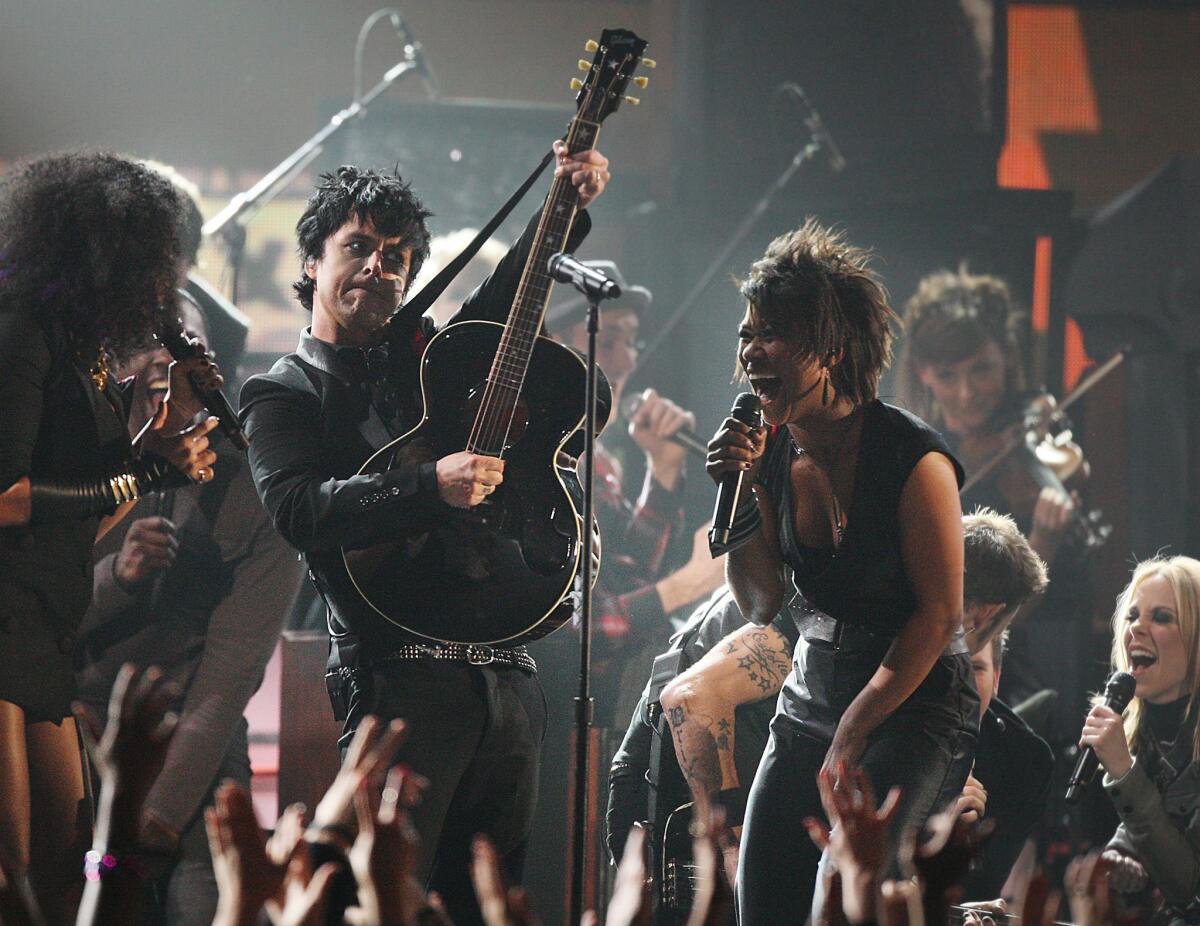How to fix the Rock and Roll Hall of Fame? Start all over again

- Share via
Ignoring the Rock and Roll Hall of Fame’s annual foolishness can be a great time-saver for fans of pop music and its history. So why do I let each new induction announcement and ceremony lure me into the same old trap of grumping the same old useless gripes?
The new crop doesn’t have any choices as completely objectionable as KISS and Hall and Oates, who got in last year.
But say the Martians landed, brandishing a death ray and demanding to hear the greatest of the greatest that popular music on Earth has to offer, or else. Would anyone reach for an album by new inductees Joan Jett, Ringo Starr, Bill Withers, Paul Butterfield Blues Band, the “5” Royales or Green Day? If so, then Zapppp -- you’re dead.
CLASSIC ROCK: Follow us on Facebook
Rather than go on complaining tiresomely, I’d like to make the most constructive proposal I can think of: Tear down the Rock and Roll Hall of Fame (the roster, not the Cleveland museum), and start all over again.
Apart from a more accurate name, the Rock and Pop Hall of Fame, the key difference in the new version would be to make it impossible for anyone but the very best to be inducted.
How so? By tying the nominators’ and voters’ hands so that they no longer could celebrate acts who are at best A-minuses and B-pluses. We can do this by putting a permanent ceiling on how many artists the hall can hold.
MORE: Live from the Rock and Roll Hall of Fame ceremony
Once the new crop, which also includes the wholly estimable Lou Reed and Stevie Ray Vaughan and Double Trouble, has been feted, the hall will number 304 inductees. I say membership should immediately be reduced to 200 and capped right there. It’s a number small enough to represent a true elite and big enough to define “elite” fairly broadly. I’m pretty sure a 200-member hall would not waste slots on the likes of KISS, Hall & Oates, Rush, Billy Joel and the Dave Clark Five.
It would work exactly as the classic Billboard 200 albums chart has done. For each new name voted onto the list, another would have to be voted off. This would threaten many an enshrined ego or legacy. This would be fantastic fun.
Making painful distinctions would give the hall some dignity and authority, and concentrate its voters’ minds on what constitutes real musical greatness. Exiles needn’t be dispatched to the void, but could remain Hall of Famers emeriti, recognized in some fashion, although not with the same prominence as the current-members’ list. And they could always hope to be voted back on, as tastes and historical perspectives changed with the times.
There would need to be transparency about how and why members were bumped. In keeping with the Rock and Roll Hall of Fame and Museum’s mandate as a tax-free nonprofit institution with an educational and cultural mission, it would assemble a panel of critics and musicians to generate essays, video documentaries and public discussions fully exploring and debating the reasons for a membership change. As time went on, these deliberations could build a valuable body of scholarship and informed argument about the aesthetics and history of rock and pop, fulfilling one of the most important functions of any worthwhile museum.
The hall’s deplorable clubbiness would end. A new era of authority, authenticity and intellectual honesty would begin.
In a hall capped at 200, music would have to come first -- and the practice of voting in new members seemingly for the sake of historical inclusiveness and popularity would end (No punk-pop acts in the hall? Why give Husker Du its due? Let’s have Green Day!).
It would become much harder to get in without an extensive and artistically unimpeachable reel of musical highlights. Artists now enshrined for secondary, nonmusical strengths (vast popularity, embodying trends, social significance, impacting the broader pop culture, and, in Ringo’s case, apparently, sheer lovableness) would have a steeper hill to climb, and that’s as it should be.
There might be a running debate over whether the Sex Pistols should get the hook because, regardless of how influential it was, they released just one album before breaking up. Madonna might be another big name on the bubble. Should her shrewd image-crafting and long pop-cultural omnipresence rescue a musical oeuvre that seems less than indispensable?
I see how Joan Jett, by the rock hall’s fuzzy standards, can be considered a landmark act for having honorably and influentially embodied a strong woman’s stance behind an electric guitar. But I wonder if even she would claim to be among the 304 greatest figures in 60-odd years of rock and pop history, let alone the top 200. When I think of sheer sustained musical greatness and originality, I don’t think of her or Green Day or Bill Withers.
Of course, I do not expect any of this to happen. It’s obviously in the Rock and Roll Hall of Fame’s business interest to keep expanding its roster of honorees, pleasing ever more stars and their fans. Nobody wants to give up having one’s cake and eating it too. And not everyone has the gumption to face the inevitable epic tongue lashing from Gene Simmons when KISS gets bounced.
Still, with so many mistakes to be amended, so much fatuousness to lose and so much substance to gain, why not shake things up? It is, after all, the rock ‘n’ roll thing to do.
Mike Boehm covered pop music for the Providence (R.I.) Journal and for The Times from 1985 through 1999.
More to Read
The biggest entertainment stories
Get our big stories about Hollywood, film, television, music, arts, culture and more right in your inbox as soon as they publish.
You may occasionally receive promotional content from the Los Angeles Times.











